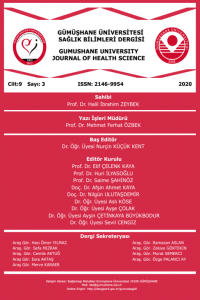Öz
Astım, çocukların fiziksel, duygusal, sosyal ve ruhsal açıdan gelişimlerini olumsuz etkileyen ve yaşam kalitesini düşüren kronik bir hastalıktır. Doğru bir astım yönetimi ile semptom kontrolünü sağlamak, astım alevlenmelerini önleyerek hastaneye yatışları azaltmak, fiziksel aktivite ve eğitim gibi günlük yaşam aktivitelerini sürdürmek, ilaçlara bağlı yan etkileri önlemek ve astım mortalitesini azaltmak mümkündür. Bu makalenin amacı; okul temelli astım yönetiminin amacı, geliştirilen çeşitli astım yönetimi stratejileri, okullarda astım yönetiminde yaşanan problemler ve okul sağlığı hemşirelerinin rolleri hakkında ışık tutabilecek bilgiler sunmaktır. Okullar, astımlı çocukları tespit etmek, astım yönetimi ile ilgili bilgi toplamak ve plan yapmak, hastalık hakkında eğitim vermek için eşsiz ortamlardır. Okul temelli astım yönetim programlarının genel amacı, astım semptomlarının oluşumunu önleyerek, iyi bir astım kontrolü sağlamaktır. Okullarda astım yönetiminde yaşanan problemler; çocuk, aile ve okul kaynaklı problemler olmak üzere üç farklı boyutta ele alınabilir. Bu problemlerin çözümüne yönelik olarak ise okul sağlığı hemşireleri tarafından astım yönetimi planı konusunda öğrenciye, öğretmenlerine ve ailelerine eğitim verilmesi önemlidir. Başarılı bir astım yönetimi için okul sağlığı hemşireleri, okul, aile ve sağlık profesyonelleri arasında koordinasyonu sağlamalıdır. Astımlı çocukların yaşamlarını optimum sağlık düzeyinde sürdürebilmelerinin, akılcı ve doğru bir astım yönetimiyle sağlanabildiği görülmektedir. Okul temelli yürütülen etkili bir astım yönetiminin çocukların sağlıklı büyüme ve gelişmeleri için önemlidir.
Anahtar Kelimeler
Kaynakça
- Isik E, Fredland NM, Freysteinson WM. (2019). “School and Community-based Nurse-led Asthma Interventions for School-aged Children and Their Parents: A Systematic Literature Review.” Journal of Pediatric Nursing, 44, 107-114.
- Engelke MK, Swanson M, Guttu M. (2014). “Process and outcomes of school nurse case management for students with asthma.” The Journal of School Nursing, 30(3), 196–205.
- Şahin NE, Aslan F. (2017). “Öğretmenlerin kronik hastalığı olan öğrencilere ilişkin görüşleri.” GÜSBD, 6(3), 35-40.
Öz
Asthma is a chronic disease that negatively affects physical, emotional, social and spiritual development of children and decreases the quality of living. By the right asthma management, it is possible to maintain symptom control, to reduce hospitalizations by preventing asthma exacerbations, to maintain daily life activities such as physical activity and education, to prevent drug-related side effects and to reduce asthma mortality. The purpose of this article is to present informations to demystify about the aim of school-based asthma management, various asthma management strategies developed, problems encountered in asthma management in schools and the roles of school health nurses in the management of children with asthma. Schools are the unique environments for identifying children with asthma, gathering information and planning about asthma management, and training on disease. The general purpose of school-based asthma management programs is to provide good asthma control by preventing asthma symptoms from occurring. Problems encountered in asthma management in schools can be handled in three different dimensions: child, family and school-related problems. Regarding the solution of these problems, it is important to be provided education to students, their teachers and families about asthma management plan by school health nurses. School health nurses should ensure coordination among school, family and healthcare professionals for successful asthma management. It is observed that children with asthma can maintain their lives at optimum health level with a rational and correct asthma management. School-based effective asthma management is important for the healthy growth and development of children.
Anahtar Kelimeler
Kaynakça
- Isik E, Fredland NM, Freysteinson WM. (2019). “School and Community-based Nurse-led Asthma Interventions for School-aged Children and Their Parents: A Systematic Literature Review.” Journal of Pediatric Nursing, 44, 107-114.
- Engelke MK, Swanson M, Guttu M. (2014). “Process and outcomes of school nurse case management for students with asthma.” The Journal of School Nursing, 30(3), 196–205.
- Şahin NE, Aslan F. (2017). “Öğretmenlerin kronik hastalığı olan öğrencilere ilişkin görüşleri.” GÜSBD, 6(3), 35-40.
Ayrıntılar
| Birincil Dil | Türkçe |
|---|---|
| Konular | Sağlık Kurumları Yönetimi |
| Bölüm | Derlemeler |
| Yazarlar | |
| Yayımlanma Tarihi | 30 Eylül 2020 |
| Yayımlandığı Sayı | Yıl 2020 Cilt: 9 Sayı: 3 |


